Business & Economy
2023: Buhari Signs N21.83 Budget Into Law
Published
2 years agoon
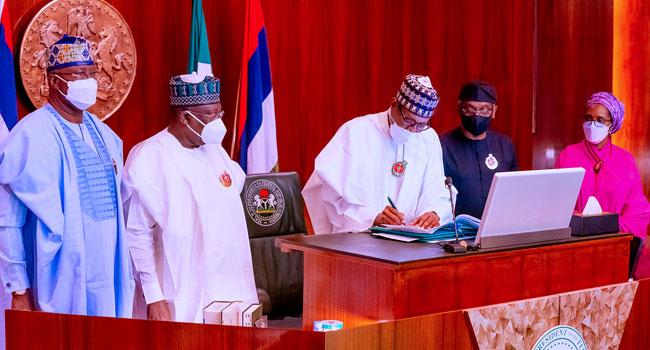
Say Adequate Provisions Made for General Elections, Transition Programme
President Muhammadu Buhari on Tuesday in Abuja signed the 2023 Budget of N21.83 trillion along with the 2022 Supplementary Appropriation Bill into law.
Speaking at the signing of the eighth and final annual budget of this Administration, the President said the aggregate expenditures of N21.83 trillion, is an increase of N1.32 trillion over the initial Executive Proposal for a total expenditure of N20.51 trillion.
The President explained that the 2022 Supplementary Appropriation Act would enable the administration to respond to the havoc caused by the recent nationwide floods on infrastructure and agriculture sectors.
As is customary, he said the Minister of Finance, Budget and National Planning will subsequently provide more details of the approved budget and the supporting 2022 Finance Act.
”We have examined the changes made by the National Assembly to the 2023 Executive Budget proposal.
”The amended fiscal framework for 2023 as approved by the National Assembly shows additional revenues of N765.79 billion, and an unfunded deficit of N553.46 billion.
”It is clear that the National Assembly and the executive need to capture some of the proposed additional revenue sources in the fiscal framework. This must be rectified.
”I have also noted that the National Assembly introduced new projects into the 2023 budget proposal for which it has appropriated N770.72 billion. The National Assembly also increased the provisions made by Ministries, Departments and Agencies (MDAs) by N58.55 billion.”
President Buhari said his decision to sign the 2023 Appropriation Bill into law as passed by the National Assembly was to enable its implementation commence without delay, considering the imminent transition process to another democratically elected government.
He, however, directed the Minister of Finance, Budget and National Planning to engage with the Legislature to revisit some of the changes made to the Executive budget proposal, expressing the hope that the National Assembly will cooperate with the Executive arm of Government in this regard.
He urged the National Assembly to reconsider its position on his proposal to securitize the Federal Government’s outstanding Ways and Means balance at the Central Bank of Nigeria (CBN).
”As I stated, the balance has accumulated over several years and represents funding provided by the CBN as lender of last resort to the government to enable it to meet obligations to lenders, as well as cover budgetary shortfalls in projected revenues and/or borrowings.
”I have no intention to fetter the right of the National Assembly to interrogate the composition of this balance, which can still be done even after granting the requested approval.
”Failure to grant the securitization approval will however cost the government about N1.8 trillion in additional interest in 2023 given the differential between the applicable interest rates which is currently MPR plus 3% and the negotiated interest rate of 9% and a 40year repayment period on the securitised debt of the Ways and Means.”
To ensure more effective implementation of the 2022 capital Budget, President Buhari thanked the National Assembly for approving his request for an extension of its validity date to 31st March, 2023.
The President directed the Ministry of Finance, Budget and National Planning to work towards early release of the 2023 capital votes to enable Ministries, Departments and Agencies commence the implementation of their capital projects in good time to support efforts to deliver key projects and public services as well as improve the living conditions of Nigerians.
Reiterating that the 2023 Budget was developed to promote fiscal sustainability, macroeconomic stability and ensure smooth transition to the incoming Administration, the President said it was also designed to promote social inclusion and strengthen the resilience of the economy.
He pledged that adequate provisions have been made in the Budget for the successful conduct of the forthcoming general elections and the transition programme.
On achieving revenue targets for the budget, the President directed MDAs and Government Owned Enterprises (GOEs) to intensify their revenue mobilization efforts, including ensuring that all taxable organizations and individuals pay taxes due.
To achieve the laudable objectives of the 2023 Budget, the President said relevant Agencies must sustain current efforts towards the realization of crude oil production and export targets.
”To augment available fiscal resources, MDAs are to accelerate the implementation of Public Private Partnership initiatives, especially those designed to fast-track the pace of our infrastructural development.
”This, being a deficit budget, the associated Borrowing Plan will be forwarded to the National Assembly shortly.
”I count on the cooperation of the National Assembly for a speedy consideration and approval of the Plan.”
On the Finance Bill 2022, the President expressed regret that its review as passed by the National Assembly is yet to be finalized.
”This is because some of the changes made by the National Assembly need to be reviewed by the relevant agencies of government. I urge that this should be done speedily to enable me to assent into law,” he said.
Those who witnessed the signing of the budget include Senate President Ahmad Lawan and the Speaker of the House of Representatives, Femi Gbajabiamila.
The President thanked the Senate President, the Speaker of the House of Representatives, and all the distinguished and honourable leaders and members of the National Assembly for the expeditious consideration and passage of the Appropriation Bill.
He also recognised the roles played by the Ministers of Finance, Budget and National Planning, the Budget Office of the Federation, the Senior Special Assistants to the President (Senate and House of Representatives), the Office of the Chief of Staff, as well as all who worked tirelessly and sacrificed so much towards producing the 2023 Appropriation Act.
”As I mentioned during the presentation of the 2023 Appropriation Bill, early passage of the budget proposal is critical to ensure effective delivery of our legacy projects, a smooth transition programme and effective take-off of the incoming Administration.
”I appreciate the firm commitment of the 9th National Assembly to the restoration of a predictable January to December fiscal year, as well as the mutual understanding, collaboration and engagements between officials of the Executive and the Legislative arms of government.
”These have made the quick consideration and passage of our Fiscal bills possible over the last four years.”
The President expressed the belief that the next Administration would sustain the early presentation of the annual appropriation bill to the National Assembly to ensure its passage before the beginning of the fiscal year.
”I firmly believe the next Administration will also sustain the current public financial management reform efforts, further improve the budgeting process, and particularly maintain the tradition of supporting its Appropriation Bills with Finance Bills designed to facilitate their implementation.
”To sustain and institutionalize the gains of the reforms, we must expedite action and conclude work on the Organic Budget Law for it to become operational before the end of this Administration.”
Acknowledging that ‘‘these are challenging times worldwide,’’ the President concluded his speech at the ceremony by expressing deep appreciation to Almighty God for His Grace, while commending the continuing resilience, understanding and sacrifice of Nigerians in the face of current economic challenges.
”As this Administration draws to a close, we will accelerate the implementation of critical measures aimed at further improving the Nigerian business environment, enhancing the welfare of our people and ensuring sustainable economic growth over the medium- to long-term,” he said.
You may like
-


2023 Election Surprise: Buhari Unveils Reasons Behind Tinubu’s Unexpected Loss To Atiku In Katsina
-
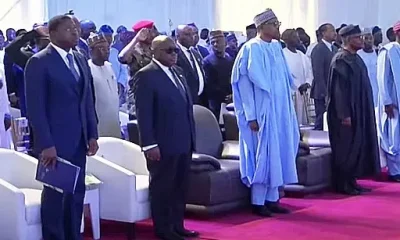

Incoming govt will build on success of Dangote refinery – Buhari
-
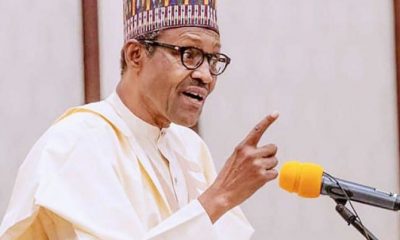

Buhari Is Set To Commission 650,000 BPD Dangote Petroleum Refinery On Monday
-
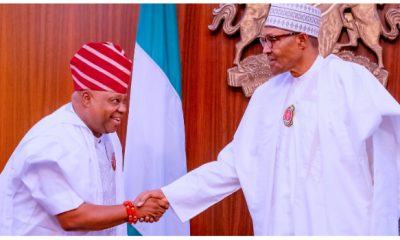

Buhari Seeks Support For Adeleke After Supreme Court Verdict
-
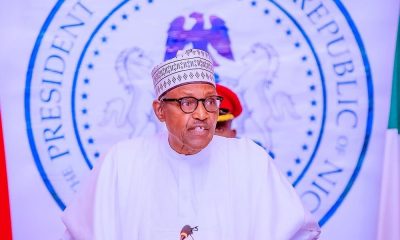

Nigeria’s Democracy Is Maturing, Buhari Tells Commonwealth Leaders
-
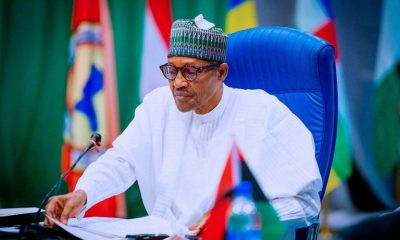

Buhari govt trains 25,000 Community Policing Officers — Adesina
Business & Economy
Senate Passes MTEF/ FSP, To Probe N8.4tn Withheld Subsidy Funds By NNPCL
Published
2 months agoon
December 3, 2024By
News Editor
The Senate has passed the 2024 – 2026 Medium-Term Expenditure Framework (MTEF) and Fiscal Strategy Paper (FSP) for implementation by the Federal Government.
The passage followed the presentation of a report by the chairman of the Joint Committees on Finance and National Planning & Economic Affairs presented by Sen. Musa, Mohammed Sani (Niger East).
The senate also tasked its Committees on Finance and Petroleum as well as Gas to investigate allegations of withheld funds by the NNPC, including NGN 8.48 trillion in petrol subsidies, and $2 billion (NGN 3.6 trillion) in unpaid taxes.
The allegation was highlighted by reports from the Nigeria Extractive Industries Transparency Initiative (NEITI) and the Revenue Mobilization, Allocation, and Fiscal Responsibility Commission.
The development comes following the Office of the Auditor-General of the Federation, saying it had received the necessary and complete documents required to verify the N2.7 trillion fuel subsidy claim by the Nigerian National Petroleum Company Limited against the government.
The Senate approved the exchange rate projection of 1,400 USD for 2025-2027 with a provision for review in early 2025, based on prevailing monetary and fiscal policies.
They also resolved that any excess on the official figure would be used for debt servicing.
During the debate on the report submitted by the Chairman Senate Committee on Appropriations, Senator Sani Musa (APC, Nigeria East ), the Lawmakers also demanded a reduction in the petrol prices against the backdrop of the commencement of the Port Harcourt Refinery.
Chairman of the Senate Committee on Appropriations, Senator Adeola Olamilekan referenced the Federal Government’s Compressed Natural Gas initiative as the underlying imperative for the adoption of the N1400 to one dollar.
According to him: “With the functioning of our refineries the demand for Forex will drop. With the CNG initiative, Nigerians will have an option for your information if you leave Benin to Lagos the amount of fuel is about 130 thousand but with CNG you can’t use more than 48 thousand Naira. Another issue to be addressed is the recurrent to-capital ratio which is very high.
The need to support the manufacturing industries was also raised by Senator Yahaya Abdullahi, of the Peoples Democratic Party, Kebbi North if the projections of the MTEF are to be achieved.
In their resolutions, the Senate also adopted inflation rate projections of 15.75, 14.21 and 10.04 per cent for 2025, 2026 and 2017 respectively.
According to the recommendations, “The 2025 Federal Government of Nigeria budget proposed spending of N47.9trilion of which N34.82 trillion is retained. New borrowings stood at N9.22tn, made up of both domestic and foreign borrowings.
Capital expenditure is projected at 16.48 trillion naira with statutory transfers standing at 4.26 trillion naira and sinking funds projected at N430.27billion.
Business & Economy
Tinubu Writes NASS, Seeks Approval For N1.77tn Fresh External Borrowing
Published
2 months agoon
November 19, 2024By
News Editor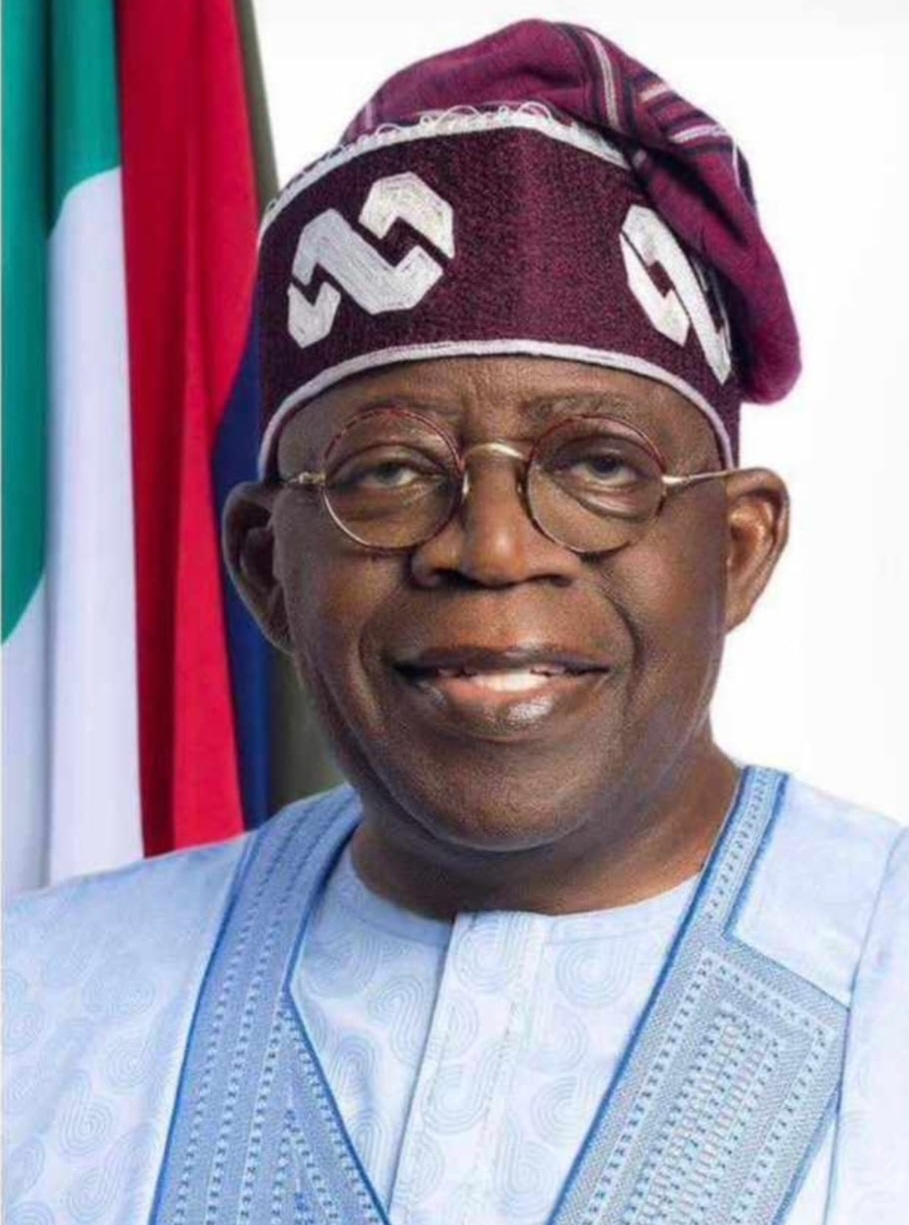
President Bola Tinubu has written to the National Assembly, seeking approval of a fresh N1.767 trillion, the equivalent of $2.209 billion as a new external borrowing plan in the 2024 appropriation act.
If approved, the loan will be used to part-finance the deficit of N9.7tn for the 2024 budget.
The president’s request was read by the speaker during plenary on Tuesday.
The president has also forwarded the MTEF/ FSP 2025- 2027 to parliament and the National Social Investment Programme establishment amendment bill, to make the social register the primary tool for the implementation of the federal government’s social welfare programmes.
This is as the Central Bank of Nigeria recently said the Federal Government spent $3.58 billion servicing the country’s foreign debt in the first nine months of 2024.
Data sourced from the Central Bank of Nigeria (CBN) report on international payment statistics showed that the amount represents a 39.77 per cent increase from the $2.56bn spent during the same period in 2023.
According to the report, while the highest monthly debt servicing payment in 2024 occurred in May, amounting to $854.37m, the highest monthly expenditure in 2023 was $641.70m, recorded in July.
The trend in international debt servicing by the CBN highlights the rising cost of debt obligations by Nigeria.
Further breakdown of international debt figures showed that in January 2024, debt servicing costs surged by 398.89 per cent, rising to $560.52m from $112.35m in January 2023. February, however, saw a slight decline of 1.84 per cent, with payments reducing from $288.54m in 2023 to $283.22m in 2024.
March recorded a 31.04 per cent drop in payments, falling to $276.17m from $400.47m in the same period last year. April saw a significant rise of 131.77 per cent, with $215.20m paid in 2024 compared to $92.85m in 2023.
The highest debt servicing payment occurred in May 2024, when $854.37m was spent, reflecting a 286.52 per cent increase compared to $221.05m in May 2023. June, on the other hand, saw a 6.51 per cent decline, with $50.82m paid in 2024, down from $54.36m in 2023.
July 2024 recorded a 15.48 per cent reduction, with payments dropping to $542.50m from $641.70m in July 2023. In August, there was another decline of 9.69 per cent, as $279.95m was paid compared to $309.96m in 2023. However, September 2024 saw a 17.49 per cent increase, with payments rising to $515.81m from $439.06m in the same month last year.
Given rising exchange rates, the data raises concerns about the growing pressure of Nigeria’s foreign debt obligations.
The total debts of the 36 states in Nigeria rose to N11.47tn as of June 30, 2024, despite allocations by the Federal Accounts Allocation Committee (FAAC), and their respective internally generated revenues (IGR).
An analysis of data from the public debt reports released by the Debt Management Office (DMO) said the rise was 14.57 per cent higher than the N10.01tn recorded in December 2023.
External debt for the states and the Federal Capital Territory also climbed from $4.61bn to $4.89bn within the period under review.
In naira terms, the debts increased by 73.46 per cent, from N4.15tn to N7.2tn, following the devaluation of the naira from N899.39/$1 in December 2023 to N1,470.19/$1 by June 2024.
Business & Economy
Protests In Abuja Demanding Investigation Into Guaranty Trust Bank Operations
Published
4 months agoon
October 15, 2024By
News Editor
A protest was held today at the Police Force Headquarters in Abuja, organized by the Coalition of Civil Society for Good Governance in Nigeria, calling for an urgent investigation into serious allegations against Guaranty Trust Bank Limited (GTB). The bank, under the leadership of Segun Agbaje, is facing accusations of corruption, money laundering, unsolicited account openings, and more.
The Chief Convener of the coalition, Comrade Tijani Usman addressed the crowd, highlighting the pervasive issue of corruption that has plagued Nigeria’s socio-economic landscape since 1960. He emphasized the critical role of the banking sector in economic development and criticized the lack of action from regulatory and law enforcement agencies regarding GTB’s alleged infractions.
“The allegations against GTB are serious and cannot be ignored,” Usman stated. He urged the Nigeria Police Force to prioritize these claims and conduct a thorough investigation to hold accountable those responsible for any wrongdoing.
Participants in the protest voiced their concerns about recent operational failures at GTB, particularly a prolonged outage of the bank’s payment systems, which resulted in substantial losses for customers. The coalition called for the bank’s management to focus on resolving these critical issues instead of engaging in activities that undermine trust.
The protesters also appealed to the Central Bank of Nigeria and the Economic and Financial Crimes Commission to take a proactive stance in investigating the allegations and ensuring accountability within the banking sector.
As the coalition continues its peaceful demonstrations, they remain steadfast in their commitment to advocating for justice for affected customers and investors. This protest reflects a growing demand for greater transparency and accountability in Nigeria’s banking system, as civil society seeks to foster an environment where corruption is actively challenged and addressed.
The response from authorities to this protest may significantly impact the future governance of financial institutions in Nigeria, highlighting the necessity for reform and vigilance in the fight against corruption.
Latest News
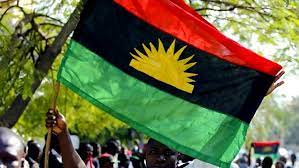

Appeal Court Affirms IPOB As Terrorist Group
ShareThe Court of Appeal in Abuja has affirmed the January 18, 2018 order by Justice Abdu Kafarati of the Federal...
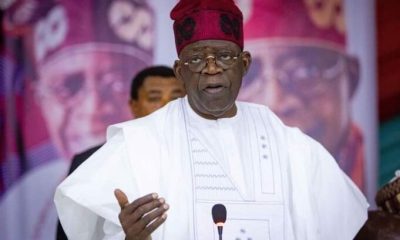

#EndSARS Movement Was Funded From US To Ambush Tinubu From Becoming President – Bisi Akande
ShareThe former interim National Chairman of the ruling All Progressives Congress (APC), has claimed that the #EndSARS movement was designed...


Court Grants Sowore ₦10m Bail
ShareThe judge gave him 24 hours to perfect the bail conditions or be remanded by the police until the bail...
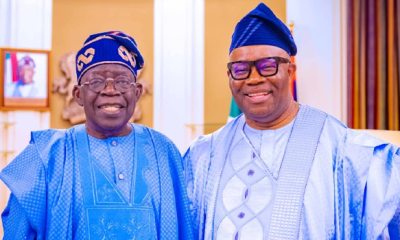

Nigeria Was On Life Support When Tinubu Assumed Office – Akpabio
ShareThe Senate President and Chairman of the 10th National Assembly, Senator Godswill Akpabio, has said the country was on a...


Dangote Refinery, Ardova Plc Strike Bulk Purchase Deal
ShareAs part of the measures to guarantee supply security of fuel at affordable prices for its customers, Ardova Plc, one...
